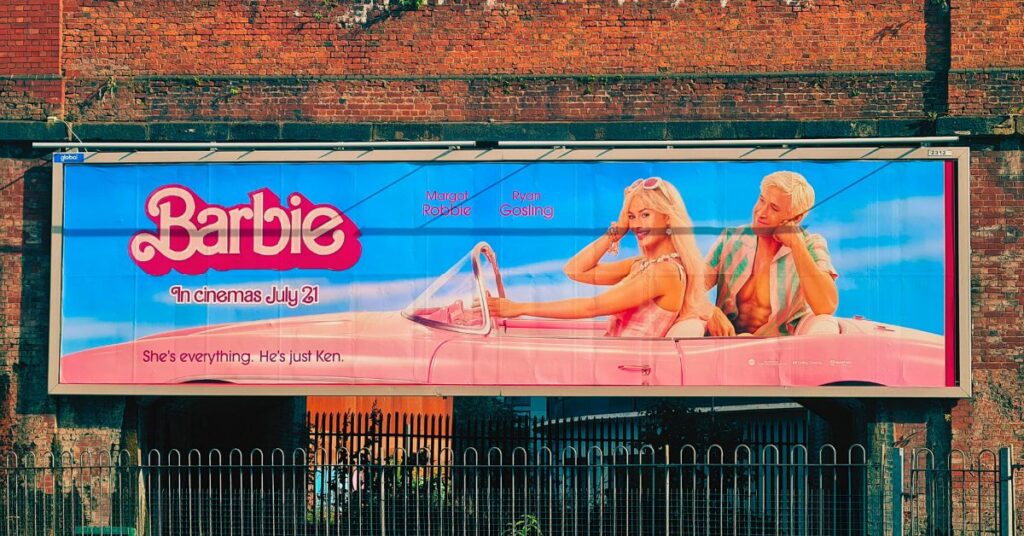Featured image: Jennifer Grace Fleming
“Some people say the silent era was the golden era of film, these people are difficult and insane” – John Mulaney, 96th Academy Awards.
It’s been one month since the Oscars marked the end of another awards season. Musical performances from all the artists nominated for this year’s ‘Best Original Song’ were interspersed throughout the show, including a moment of virality from a pink-clad Ryan Gosling and his vanguard of 65 Kens. From original scores to compilation soundtracks, 2023 saw the true matrimony of sound and vision. Here are a few of the highlights.
Barbie
It’s nearly impossible to speak about the sound and cinema of 2023 without almost immediately thinking about Barbie. Its soundtrack Barbie the Album, produced by Mark Ronson, is masterfully utilised across the film’s two-hour runtime and features popular names including Charli XCX, Ice Spice, Pink Pantheress, and Tame Impala. It also features original songs by two cast members; Ryan Gosling put his entire Kenergy into ‘I’m Just Ken’, while pop superstar and Mermaid Barbie, Dua Lipa, wrote and released ‘Dance the Night’ for the film’s soundtrack.
The undeniable stand-out of this soundtrack, though, is ‘What Was I Made For’. Orchestrating the film’s emotional pinnacle, the Billie Eilish ballad was one of the biggest songs of last year and has taken awards season by storm, bagging Eilish and brother Finneas O’Connell two Grammys, a Golden Globe, and most recently, their second Academy Award for Best Original Song.
Oppenheimer
Greta Gerwig’s Barbie made up one-half of last summer’s cinematic hype, alongside Christopher Nolan’s Oppenheimer. The film’s score was composed by Ludwig Göransonn, who had previously collaborated with Nolan on Tenet. Anyone who’s seen the film (and really, who hasn’t?) can appreciate the extreme gravitas that the score brings to its laden atmosphere, driving the narrative in a way that few other composers could have achieved. It earned Göransonn a sweep of accolades including a Golden Globe, Critic’s Choice, Grammy, BAFTA and Academy Award for Best Score.
The ‘Can You Hear the Music’ montage is a particular stand-out. Göransonn shares Nolan’s decision to use the violin, “the most expressive instrument”, to sonically portray Oppenheimer. This can be heard explicitly in ‘Can You Hear the Music’ and throughout.
Saltburn
Oscar-nominated numbers aren’t the only examples of sound lending itself impactfully to the past year of cinema. The tail-end of 2023 saw the rapid injection of Saltburn into the cultural zeitgeist, no meet-up with friends in December complete without talk of the shocking scenes of soil and suds. Those who watched couldn’t stop talking about the film’s use of music, particularly from the early 2000s, the period in which it’s set.
Bloc Party’s ‘This Modern Love’ backlights a scene set in protagonist Oliver’s first university semester, seeing his fast friend Felix Catton out with others but with no invite for Oliver himself. MGMT’s ‘Time to Pretend’ serves as the backdrop for Oliver’s acclimatisation to summer at Saltburn, lounging by the pool, drinking and soaking up the luxurious lifestyle led by the Catton family. Flo Rida’s ‘Low’ even features during a karaoke session in the sprawling mansion.
What took popular culture most by storm, however, was the trilogy of songs featured towards Saltburn’s close. ‘Perfect’ – Mason vs Princess Superstar (Push it push it / Watch me work it / I’m perfect) and ‘Loneliness’ – Tomcraft (Happiness seems to be loneliness / And loneliness chilled my world) soundtrack the film’s pinnacle, an ostentatious birthday party set within Saltburn’s lavish grounds. ‘Loneliness’ has a particularly ominous element enveloped within its rushing BPM and is a perfect accompaniment for the film’s sinister turn.
It’s also the result of Saltburn’s final scene that Sophie Ellis-Bextor’s ‘Murder on the Dancefloor’ has gained a new lease of life and TikTok virality 13 years after its original release, going so far as to reclaim Number Two on the UK charts.
The Killers of the Flower Moon
An honourable mention goes to Robbie Robertson. Though most renowned for his years spent in The Band, the Founding Fathers of Americana, Robbie also had a long-standing relationship with one Martin Scorsese. This started in 1978 when the director shot their famed farewell concert The Last Waltz and led to Robertson working as a producer and consultant on Scorsese’s films for over four decades.
The Killers of the Flower Moon marked not only the second, but also the last time he would work as lead composer for Scorsese following Robertson’s death last August. The film follows the tragic betrayal and murder of the Osage tribe at the hands of greed and corruption. Given his own indigenous roots (growing up on the Six Nations Indian Reserve), this final creative work by Robertson feels like somewhat of a legacy.
Robertson passed away before seeing the final product, but his swan song is a dominant component of the film; a testament to his unique talent and a love letter to his heritage. Guitars, flutes, banjos, shakers, and vocal cries all work in further elevating the already visceral, politically charged story put forth by Scorsese.






Leave a reply